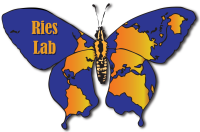Classes I have taught at Georgetown University include:
Global Climate Change Ecology (BIOL368):
- Over the past century, the mean surface temperature of our planet has increased slightly less than 1°C. While this may seem like a small increment, global warming is already profoundly affecting Earth’s organisms and ecological communities, and predictions for the impacts of continued change range from severe to catastrophic. In this class, we will explore the causes and biological consequences of climate change on Earth. Through lectures, discussion, films, critical reading of the literature, and examination of long-term data sets and resources from NASA’s Earth Observatory, students will gain an understanding of: how Earth’s climate system functions, how past climatic fluctuations compare to projected future changes, how human activities contribute to climate change, how climate change affects organisms, communities, and ecosystems, and how science is (or is not) translated into policy.
- Prerequisites: Foundations II (or permission)
- Course textbooks: None (primary literature and IPCC Reports)
Conservation Biology (BIOL365):
- Earth is currently in its sixth major extinction event. All forms of biodiversity are being lost at rates unprecedented in the geological record and this event is being caused almost entirely by the actions of a single species: Homo sapiens. The need to mitigate the effects of biodiversity loss has given rise to the science and practice of Conservation Biology. This relatively new discipline encompasses core biological perspectives from the fields of ecology and evolution as well as applied approaches such as range management, forestry, and fisheries biology. Additionally, Conservation Biology intersects with political science, sociology, law, economics, and engineering in its pursuit of conserving biological diversity. In this class we will focus on biological principles that form the basis of successful conservation efforts and explore societal frameworks in which Conservation Biology operates. We will also grapple with a current controversy of how best to approach conservation – from a nature-protectionist or human-centered view.
- Prerequisites: Foundations II and Ecology (or permission)
- Course textbooks: Conservation Science by Kareiva and Marvier and Half-Earth by E.O. Wilson (recommended)
Foundations of Biology II (Biol104):
- This second semester of the foundational first-year course in Biology focuses on ecology, evolution, systematics, and conservation
Advanced Statistical Models for Biologists (Biol 419):
- Advancements in statistical models are coming faster and faster each year and at the same time, best practices for statistics are constantly changing. As a field, statistics is becoming increasingly difficult to navigate for practitioners who are not experts in quantitative methods and even for statisticians themselves. This class was designed for ecologists who are not training to be specialized in quantitative methods. Instead, it introduces them to the main statistical advancements with a special focus on generalized linear models, hierarchical models and Bayesian approaches to estimation. The goal is for them to be familiar enough with the changing landscape of statistics to be able to competently read the literature, review the literature, determine what statistical tests they need to use for their own research and determine whether or not it is tractable for them to execute those tests themselves or if they need to consult with or even collaborate with an expert in quantitative methods. Even when collaboration is necessary, modern scientists need to be conversant enough in the dominant emerging methods so that they can be active participants in planning and interpreting the statistical tests.
- Prerequisites: Biol 417 (or permission)
- Course textbooks: Applied hierarchical modeling in Ecology (Kery and Royle)
 The Ries Lab of Butterfly Informatics
The Ries Lab of Butterfly Informatics